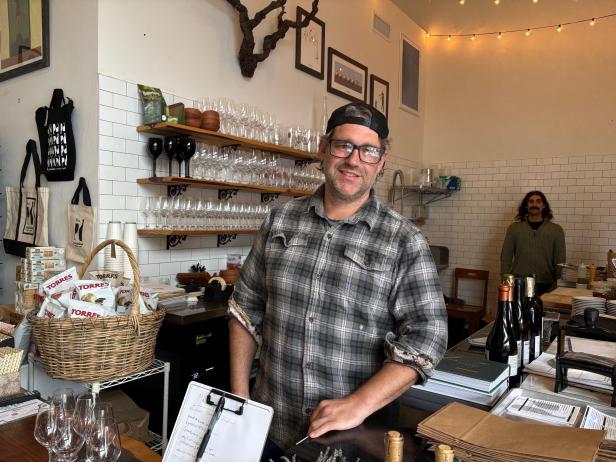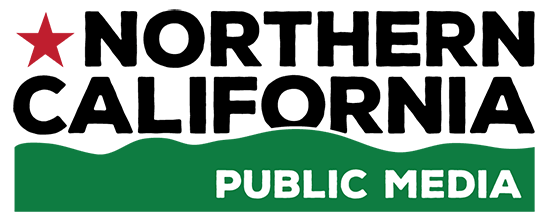 photo credit: Tina Caputo
photo credit: Tina CaputoDC Looney, co-owner of The Punchdown wine bars in Sebastopol (shown here) and Oakland,
says he has serious concerns about wine tariffs.
Days after winning a second term in the White House, President-elect Donald Trump proposed a 10 to 20% tariff on all goods coming into the United States. The idea, he says, is to reduce trade deficits and help domestic businesses by raising prices on imports. But many in the U.S. wine industry say that imposing tariffs on imported wines and winemaking supplies would hurt the sector more than it helps.
You might think that adding a tax — or tariff — on imported wines would give the domestic industry a boost. Why buy more expensive bottles from overseas when you can pay the same amount or less for local wines? But experts say the issue is more complicated than that — and it starts with who pays the bill.
Ben Aneff is head of the U.S. Wine Trade Alliance in Sacramento and the managing partner of Tribeca Wine Merchants in New York.
“We sort of all end up paying for the tariff, but the importer writes the check to the U.S. government,” Aneff said. “Then, they would obviously pass that cost up to the distributor, who would pass that cost up to the restaurant or the retailer, who would end up having to pass costs on to consumers.”
That would mean less revenue for anyone selling imported wines in the United States, and ultimately, higher prices for consumers.
“Retail wine businesses operate on pretty small margins, anyway,” Aneff said. “Imported wines are actually one of the very few places you can make a pretty good margin, and you sort of depend on it. I mean, no doubt, consumers are going to see a lot higher prices. But at the same time, I'm skeptical that we'd be able to pass everything along to the consumer.”
DC Looney, co-owner of The Punchdown wine bars in Sebastopol and Oakland, also has serious concerns about wine tariffs.
“My initial reaction was kind of horror and shock, because we carry a lot of imported wines, and also we're very price sensitive,” Looney said. ”So, knowing the impact that the tariffs would have will change a lot of our drinking culture and the way that we can do business.”
If Trump does impose tariffs on imported wines as promised, Looney says he’ll try to avoid raising prices.
“Well, I mean, we would do what we can—try to lower our margins a little bit so that it would absorb some of the shock, but that's also at our expense,” Looney said. “We're a small business and we work hard, and we run on very thin margins as it is. To be honest, we probably would gravitate a little more towards wines that might not be tariffed, including local wines.”
While domestic wineries could have an advantage in some instances, many local vintners are wary of tariffs.
John Scupny is the co-founder and winemaker at Lang & Reed Napa Valley, a small-production winery in St. Helena.
“The potential impact on the domestic wine industry would at first seem like it wouldn't be a big effect, that it would actually favor California or domestic producers because the tariff would be imposed upon imported wines coming into the United States,” Scupny said. “But there's always a backlash.”
Along with retaliatory tariffs on U.S. wine exports, Scupny said, tariffs would result in a host of negative effects that would put additional pressure on the U.S. wine industry in a down market.
“Right now, the conversation is, how many distributors are floating full containers of imported wines to the United States in this fourth quarter of the year, that they would not have otherwise brought in, to beat the tariffs?” Scupny said. “So, they're utilizing capital that they would otherwise be utilizing to buy domestic wines.”
That could hurt domestic brands’ chances of getting placements in retail shops and restaurants across the country, Scupny said. And if tariffs are imposed on all imported goods, U.S. wineries like his will have to pay more for key winemaking supplies like French oak barrels.
“Most of our glass is not made in the United States,” Scupny said. “We have no cork business in the United States. Most of the capsules are made in Spain or in France. So immediately our supplies will go back to probably the levels that we saw during the worst part of Covid, where glass prices at least doubled, sometimes tripled, what we were paying for in 2019.”
To help fend off such tariffs, Scupny said industry trade groups are already meeting with government representatives in Washington, D.C.
“I think everybody is working behind the scenes, but I also think that the policy that's being put forward is a high-drama one,” Scupny said. “ We will just have to see. Sometimes the drama is a little higher than the reality, from our past experience in this circumstance.”
Aneff of the U.S. Wine Trade alliance agrees that tariffs are far from a done deal. He said he’s hoping that instead of imposing universal tariffs, the Trump administration will agree to make an exception for imported wines.
“Now, I do want to say, tariffs are certain,” Aneff said. “Tariffs on wine are absolutely not certain. So, I would expect members of Congress around the country are really going to start hearing from their local businesses about the products that impact them the most. Because wine really is depended upon by so many small businesses in all 50 states—and that’s just not true of most of the other targeted products.”

 Live Radio
Live Radio